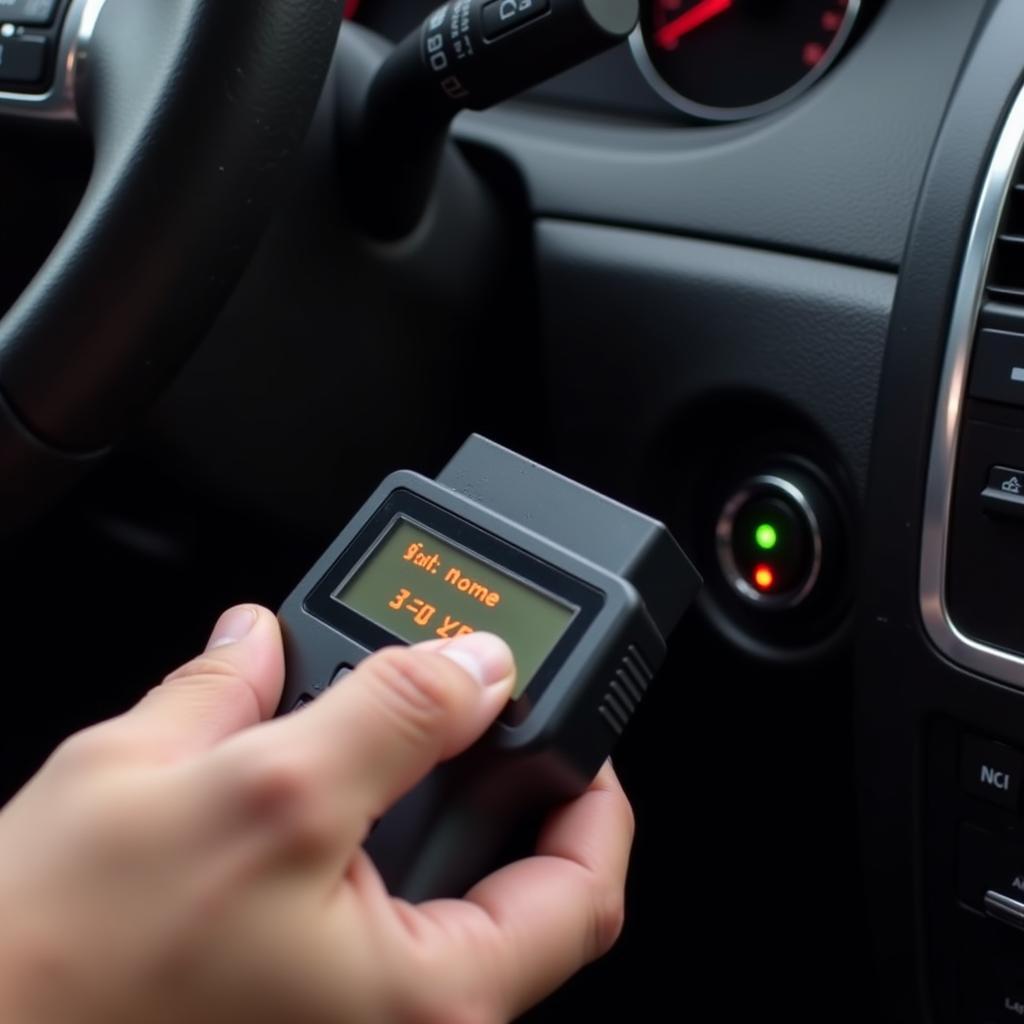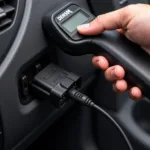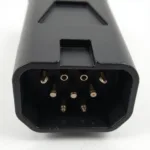So, your check engine light just flashed on, and you’re feeling that familiar pang of anxiety. Don’t panic! Before you rush to the mechanic, consider this: you can diagnose many car problems yourself with a handy tool – an OBD2 scanner. But with so many options out there, how do you choose the right one? This comprehensive guide is here to help you navigate the world of OBD2 scanners and make an informed decision when you buy an OBD2 scanner.
What Exactly is an OBD2 Scanner and Why Should You Buy One?
Think of an OBD2 scanner as a translator for your car. It connects to your vehicle’s onboard computer (through the OBD2 port, usually located under the dashboard) and reads diagnostic trouble codes (DTCs). These codes, presented as a combination of letters and numbers, pinpoint potential issues with your engine, transmission, emissions system, and more.
Owning an OBD2 scanner is like having a personal mechanic at your fingertips. It empowers you to:
- Diagnose car problems early on: Identify issues before they escalate into costly repairs.
- Save money on mechanic visits: Avoid unnecessary trips and potentially inflated diagnostic fees.
- Gain a deeper understanding of your car: Track performance, monitor fuel economy, and stay informed about your vehicle’s health.
- Reset your check engine light: Once you’ve addressed the issue, clear the DTC and turn off that pesky warning light.
Different Types of OBD2 Scanners: Finding the Perfect Fit
Before you buy an OBD2 scanner, consider what you need it for. OBD2 scanners come in various forms, each catering to different levels of expertise and needs:
-
Basic Code Readers:
- Ideal for: Car owners who want a simple way to read and clear basic DTCs.
- Features: Typically affordable and easy to use, often with a small screen displaying the code and a brief description.
- Limitations: Might not provide in-depth data or advanced features.
-
Bluetooth OBD2 Scanners:
- Ideal for: Users who prefer a wireless connection and want to leverage smartphone apps for diagnostics.
- Features: Connect to your smartphone or tablet via Bluetooth, allowing you to view real-time data, graphs, and access a wider range of diagnostic features through dedicated apps.
- Limitations: App functionality can vary, and some apps might require a subscription fee.
-
Advanced Professional Scanners:
- Ideal for: Mechanics and experienced DIYers who need comprehensive diagnostics and advanced functionalities.
- Features: Offer a wide array of features, including live data streaming, bi-directional control (allowing you to activate certain car components), and access to manufacturer-specific codes.
- Limitations: Can be significantly more expensive and require a higher level of technical knowledge.
Key Factors to Consider When You Buy an OBD2 Scanner:
Now that you’re familiar with the different types, let’s delve into the essential factors to consider before making your purchase:
-
Compatibility:
- Year of manufacture: OBD2 scanners are generally compatible with vehicles manufactured from 1996 onwards in the US. However, it’s always wise to double-check compatibility for your specific car model and year.
- Vehicle make and model: Some scanners are designed for specific car makes (e.g., volkswagen wagen obd2), while others offer broader compatibility.
-
Features:
- Code reading and clearing: Ensure the scanner can read and clear both generic and manufacturer-specific DTCs for your vehicle.
- Live data streaming: This feature allows you to view real-time sensor data, such as engine RPM, coolant temperature, and oxygen sensor readings, which can be invaluable for troubleshooting.
- Smog test readiness: Check if the scanner supports emissions readiness checks to ensure your car is prepared for emissions testing.
-
Ease of Use:
- User interface: Opt for a scanner with a clear, intuitive interface and an easy-to-read display.
- Instructions and support: Ensure the scanner comes with comprehensive instructions and that the manufacturer offers reliable customer support in case you encounter any issues.
-
Budget:
- Price range: OBD2 scanners can range in price from affordable basic models to more expensive professional-grade devices. Determine your budget and look for a scanner that offers the best value for your needs.
Expert Insights: What the Pros Look For
“When choosing an OBD2 scanner, I always prioritize compatibility, especially for newer car models,” says John Smith, a certified automotive technician with over 15 years of experience. “It’s also crucial to check if the scanner supports the specific protocols and modules used in the vehicle you’ll be working on.”
Don’t Forget About Updates!
The automotive industry is constantly evolving, and so is the technology behind OBD2 scanners. Many modern scanners offer firmware updates, which can add new features, improve compatibility with newer car models, and fix potential bugs.
When you buy an OBD2 scanner, consider the manufacturer’s update policy and choose a scanner that offers regular updates to ensure optimal performance and longevity.
Buy an OBD2 Scanner and Take Control of Your Car’s Health
Investing in an OBD2 scanner is a smart move for any car owner. It empowers you with the knowledge and tools to understand your vehicle’s health, diagnose problems early on, and potentially save hundreds of dollars in repair costs.
Remember to consider your individual needs, budget, and the factors outlined in this guide when making your decision. With the right OBD2 scanner in hand, you’ll be well-equipped to tackle car troubles head-on and keep your vehicle running smoothly for miles to come!
FAQ
1. Do I need a different OBD2 scanner for different cars?
While most OBD2 scanners work with a wide range of vehicles, it’s always best to check compatibility with your specific car model and year. Some scanners might offer more specialized features for certain car makes.
2. Can an OBD2 scanner fix car problems?
An OBD2 scanner is primarily a diagnostic tool. It identifies potential problems but doesn’t fix them. Once you’ve identified the issue, you can then decide whether to address it yourself or consult a mechanic.
3. Are Bluetooth OBD2 scanners reliable?
Yes, Bluetooth OBD2 scanners are generally reliable, and the wireless convenience they offer is a significant advantage. Ensure your chosen scanner uses a stable Bluetooth connection and choose a reputable brand with positive user reviews.
4. What does it mean if my OBD2 scanner can’t connect to my car?
If your scanner fails to connect, double-check that your car is OBD2 compliant (most cars from 1996 onwards are), ensure the ignition is turned on, and verify that the OBD2 port is clean and free of debris.
5. Can I use an OBD2 scanner on a diesel engine?
Yes, OBD2 scanners can be used on both gasoline and diesel engines, as long as the vehicle is OBD2 compliant. However, some scanners might offer more specialized features for diesel engines, such as reading and clearing diesel particulate filter (DPF) codes.
6. What should I do if I get an OBD2 code I don’t understand?
Don’t panic! If you encounter a code you’re not familiar with, note down the code and research its meaning online. There are numerous resources available, including online forums and dedicated OBD2 code databases, that can provide detailed information about specific codes and potential solutions. You can also take your car and the code to a trusted mechanic for further diagnosis.
7. Where can I buy a reliable OBD2 scanner?
You can find OBD2 scanners at various retailers, including auto parts stores, online marketplaces, and specialized automotive tool suppliers. Consider factors like brand reputation, customer reviews, warranty, and after-sales support when choosing a seller.
Still have questions?
Feel free to reach out to our team for personalized assistance. We’re available 24/7 via WhatsApp: +1(641)206-8880 or Email: [email protected].


